#Irish Traditional Singing
Text

The warm September air was full of tantalising aromas, which combined to create an intoxicating perfume that nothing bottled by a human could ever hope to reproduce.
Algy flew over to a small rock where some late heather was still blooming, and took a big, deep breath. He could smell the heather, and the bog myrtle too, but strongest of all in the autumn sunshine was the fragrance of the wild thyme.
Algy just couldn't help himself. He opened his beak as wide as he could and started to sing one of the most famous and popular of the Scottish/Irish folk songs, which is so well known that at any concert in the Celtic countries where it is performed, the entire audience invariably join in. All together now…
Will ye go lassie, go?
And we'll all go together
To pluck wild mountain thyme
All around the blooming heather
Will ye go lassie, go?
[This is the chorus of the traditional Scottish and Irish folk song known as Wild mountain thyme or Will ye go, lassie, go? which was made famous world wide by recordings from the mid 20th century onward, but whose origins go back in both Scotland and Ireland to previous centuries.]
There are many recorded versions of this song by people both famous and unknown, but Algy hopes you will enjoy this one, which builds up to quite a climax from a quiet opening. This is an Irish version, but the singing, the instruments, and the scenery in the video would not be very much different here in Scotland:
youtube
Footnote for those interested, from Wikipedia:
"Wild Mountain Thyme" (also known as "Purple Heather" and "Will Ye Go, Lassie, Go?") is a Scottish/Irish folk song. The lyrics and melody are a variant of the song "The Braes of Balquhither" by Scottish poet Robert Tannahill (1774–1810) and Scottish composer Robert Archibald Smith (1780–1829), but were adapted by Belfast musician Francis McPeake (1885–1971) into "Wild Mountain Thyme" and first recorded by his family in the 1950s.
While Francis McPeake holds the copyright to the song, it is generally believed that rather than writing the song, he arranged an existing travelling folk version and popularised the song as his father's.
Tannahill's original song, first published in Robert Archibald Smith's Scottish Minstrel (1821–24), is about the hills (braes) around Balquhidder near Lochearnhead. Tannahill collected and adapted traditional songs, and "The Braes of Balquhither" may have been based on the traditional song "The Braes o' Bowhether".
#Algy#photographers on tumblr#Scotland#wild mountain thyme#will ye go lassie go#celtic women#scottish folk music#irish folk music#Scottish Highlands#singing#traditional music#heather#wild thyme#adventures of algy#original content#jenny chapman#celtic music#celtic revival#folk songs
51 notes
·
View notes
Text
i just came across ai covers on youtube and people are requesting songs in the comments instead of getting enraged and i am further losing hope in humanity and turning to misanthropy
#meins#for a minute i got really excited about henning may singing take me to church :(#i hate people#have you no appreciation for or understanding of art? clearly not.#why would you want to listen to an ai generated song? even if it sounds like your favourite singer it's not them#it has no feelings to meaning to intention. it is empty and soulless#reading the booklet for sinéad o'connor's album of traditional irish and folk songs gave me so much appreciation for her#she wrote a little bit about each song. why she chose it or what it means to her.#it has added so much to my enjoyment of those songs and i think of it whenver i listen to it#they were chosen with intention with love with a deep appreciation for the music and lyrics and there is a story behind it all#it is art and love and human#i see aboslutely no appeal in ai generated 'music' or 'art'#and i hate that i fell for it for a minute#i was sceptical because i had never heard of henning may covering hozier and since it wasn't just 20-60 sec i am certain#i would have heard about it by now#and something was just a little bit... unsatisfying? something was missing which does apply to a lot of cover songs#(i could go on hour long rants about why people fuck up danny boy (and sinéad o'connor does it best (because she actually takes her time)#or trash madonna's version of don't cry for me argentina (again a song ruined for by everybody else but sinéad - once she has sung somethin#i have a hard time enjoying it by anybody else. the parting glass is an exception. hozier's version is phenomenal))#but! henning may not giving it his all for a cover? unlikely. very unlikely.#anyway this concludes my tuesday night rant. rather here in the tags than some poor person's inbox.#or i would have kept fuming by myself for another hour or two
18 notes
·
View notes
Text
Hozier singing in Gaeilge is something that can be so personal
#hozier#unreal unearth#.txt#one step closer to getting the hozier singing traditional irish folk songs album of my dreams
1 note
·
View note
Text
Happy New Year's Eve!
In the words of the Von Trapp Family’s “Sound of Music” and their farewell song, “So long, farewell, auch wiedersehen, goodbye” to 2023, At midnight tonight, we’ll give a hearty welcome to 2024. Good-bye past and hello to the new that is in store for us. We are ready for the count-down!
Strike up the band because I plan on singing new songs of great expectations for 2024, accompanied by…

View On WordPress
#band#blog#christian#God made flesh#God moments#happy new year&039;s eve#incarnation of jesus#inspiration#irish tradition#new song#open the door#prayers answered#psalm 96:1#sing to the lord a new song#So long farewell#songs#Souind of Music#Von Trapp Family
0 notes
Text
WHYY is almost every single song a love song can't we sing about something else for a change???
#If anyone has any song to suggest that isn't a love song i'd appreciate it#I tend to like folk/acoustic songs with not a lot of drums#But also sometimes i like drums#''I love you you left me i can't do it without you'' how about you kill yourself and stop singing#How about that#I also hate songs with a long ass instrumental time before they start singing#Like stop playing idc about the music#There should be more songs with only voice no instruments#Because i like them#And i can't find them#They are always playing for a minute before they star singing#Like brother after the first repetition i know how it goes start singing#Like yes this is a rant because i can never find songs i like#Even from singers or bands i like i'll find like 2 or 3 songa and then all the othera are shit#Like i'd love hoziers songs if they didn't have such a heavy drum#Like i think francesca wouls be so beautiful only voice or acoustic#He sang a traditional irish song called humours of whiskey and that is my favourite thing i've ever heard him sing#Everyone put down the fucking instruments and start singing#Like this is obviously only my opinion. Like people don't be weird about this please
0 notes
Text
little bits of irish history for curious hozier fans: street signs edition
Do you love the song Butchered Tongue? Pay attention to these lines here:

So, may I draw your attention to the The Official Languages Act 2003 (Section 9) Regulations 2008 (S.I. No. 391 of 2008).
ok stay with me
In 2008, the Irish government passed legislation that made it mandatory for road signs in Ireland to have both Irish (Gaeilge) AND English names on them (or, in Gaeltacht areas where Gaeilge is still the first language, only in Irish). Here’s an example:
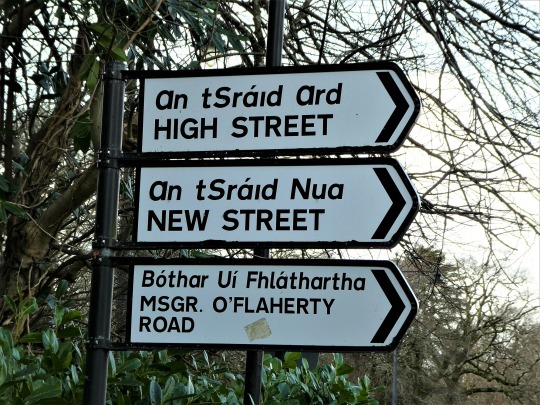
The Irish, or Gaeilge, is always above the English and italicised. This is because that while Gaeilge and English are both official languages of Ireland, Gaeilge is the ‘first’ official language
However, while it was technically only legislated in 2008, bilingual road sings in Ireland had been extremely common for decades prior to it officially being made law. In fact, the first bilingual signs date back to the early 20th century - before our independence from Britain!
In Tom Spalding’s book Layers: The Design, History and Meaning of Public Street Signage in Cork and Other Irish Cities, he found that the first recorded bilingual street sign was in Blackrock, Dublin (An Charraig Dhubh, Baile Átha Cliath). Their local council in 1901 rolled out yellow and black bilingual road sings as part of the Gaelic Revival.
The Gaeilc Revical was a period of time in Irish history that saw a huge resurgence of Gaelic art, sport, and language. Literature was written by Irish people about Irish history, current affairs, and folklore. Traditional Irish music was learned and played again. Gaelic games (Gaelic football and Hurling) spread across the country. And Gaeilge, our language, was to experience an incredible revival.
Despite Ireland’s long colonial history, Gaeilge actually remained the majority tongue until the early 19th century. However, a combination of teachers beating children for speaking it at school, the genocide of the famine wiping out mainly poorer communities more likely to speak Gaeilge, and the knowledge that speaking English unfortunately provided more opportunities than Gaeilge, the language was almost killed off. (This is shown most clearly after the 1800 Act of Union that meant Ireland was ruled directly from London, with no parliament in Dublin).
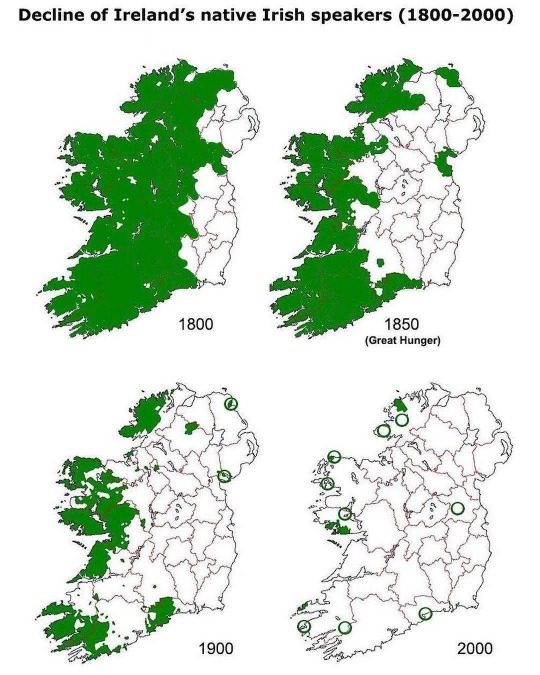
Although these maps make for grim viewing, Irish is so very far from dead. Our children learn it from the ages of 4-18 in school (though I believe it can and should be taught better, but I digress). Gaeltacht communities are still going strong particularly in the west of the country. There are more Irish-language schools (gaelscoileanna) than ever before.
And every day as we pass by road signs that display Gaeilge proudly, it is as a result of decades, centuries of people refusing to stop speaking our mother tongue despite incredible violence.
I am far from a fluent Irish speaker, despite my 14 years of learning the language in school. But what Gaeilge I have, I have proudly.

(The work isn’t over, however. I do not feel knowledgeable enough to speak on Northern Irish efforts to implement more widespread bilingual signage but anyone who wishes to share some info please do!!)
6K notes
·
View notes
Text
❝ “Columbia now nine times the speed of sound.”
“Roger that, Dan, I’ve got a solid TACAN locked on, uh, TACAN twenty-three.”
“The, uh, tracking data, map data and pre-planned trajectory are all one line on the block.”
These authentic samples of communication between NASA and astronaut Dan Brandenstein on the space shuttle Columbia place us in orbit around our planet. Kate has said of “Hello Earth,” “…this is the point where she’s so weak that she relives the experience of the storm that took her in the water, almost from a view looking down on the earth up in the heavens, watching the storm start to form - the storm that eventually took her and that has put her in this situation.” Our narrator is having another out-of-body experience but this time it’s not nearby, on terra firma, but literally out of this world, and it seems to be final. She is high up above our earth, looking down, and there is a shocking sense associated with that as so few human beings have ever left our world to look back on it. There is a disconnection from what is common, known. I am reminded of The Overview Effect, the very real psychological and cognitive shift experienced by astronauts and cosmonauts—anyone who has left the planet and gone a sufficient distance to look back and perceive our planet not as a familiar home, but as a tiny, fragile ball, barely protected by a thin membrane of atmosphere. This awed feeling is described as one of ultimate compassion and understanding of the imperative to preserve and safeguard the planet.
After the NASA samples, we join our narrator floating in space like the Star Child in “2001: A Space Odyssey,” of the earth, but no longer attached to it, in fact freed from it. The tether has been cut. She is detached from her life and its meaning: there is an innocent, bemused approach as she plays a little game. She is so far from home, she can hold up one hand and block the planet from her field of vision—the earth is a toy. And we shift place, time, and point of view (as Kate so often does in her music) to our narrator driving home in a car at night, looking up at the sky, her loved one asleep on the seat beside her (a sweet, gentle, highly cinematic image, and all the more moving when we understand where our narrator currently is and the loss ahead), when she sees something bright streak across the sky. As she watches it shoot through the stars, she sings, amazed, “Just look at it go!” And what is “it?” Shooting star? Satellite? Space shuttle? A “little light?” If all time is simultaneous, has she glimpsed her own soul shooting past the planet? It is her own little light, a mind-boggling and heartbreaking idea—the cry in her voice when she sings this line indicates that she understands the meaning of this object, and its finality.
At this point, something very unexpected happens. An ethereal, arresting male choir sing a passage based on a traditional Georgian folk song from the Kakhetian region called “Tsintskaro.” It is a shocking transition, one that makes us hold our breath so as not to disturb this sudden, delicate, transcendent moment. Kate on the men’s chorus: “They really are meant to symbolize the great sense of loss, of weakness, at reaching a point where you can accept, at last, that everything can change.”
Our narrator, in full Overview Effect at this point, watches storms form and move to threaten the lives she sees below. She cries out to them in vain, all of them, the sailors, life-savers, cruisers, fishermen, anyone on or near the sea, to protect themselves. We hear in this section a few of the Irish instruments, bringing in echoes of meaning from the previous song “Jig of Life.” Here I am reminded of the idea of the Asian goddess Kuan-Yin, or the Buddhist idea of a Bodhisattva, a human who has attained ultimate awareness (Buddhahood) but motivated by compassion, refuses to leave this plane of reality for the benefit of all sentient beings. Our narrator, moved by the end of her own life, is now able to perceive the ephemeral nature of all creation. Everyone can be exposed to danger, everyone can suffer, everyone can—and will—die. This truth is universal. But she is unable to prevent or stop this truth. No one can.
She then sings a passage that is full of several meanings. She says she was there at the birth, out of the cloudburst, the head of the tempest. This could be the storm that took her, or it could be, from her newly widened perspective of awareness, the start of life itself, the start of the universe. We were all there, we are all made of the matter from a singularity—we are all star dust. The murderer of calm is this physical reality itself. All that is born must die. Entropy exists. She understands this and cries out, “J’accuse.” Hence the ultimate compassion for this tiny little blue ball.
The piece ends with whale song, sounds of radar, and a very mysterious, arcane passage spoken in German which, when translated into English, means “Deeper, deeper, somewhere in the deep there is a light.” In German, the word “tief” can also mean “profound,” and I am reminded of the Latin phrase at the beginning of the Christian Psalm 130 “De profundis clamavi ad te:” “out of the depths I cry out to you.” In the depths of sorrow, in the endless well of suffering, there is a light. Compassion is the light. ❞
via: (x)
#*#wherein someone has managed to perfectly articulate all the reasons why it's /the/ kate bush song. at least to me.#the amount of times that i've flat-out sobbed my heart out to it... wah!
90 notes
·
View notes
Text
“The farthing… has vanished”
Remember that line from the Nazi Zombie Flesheaters minisode? Sick and twisted. And we need to talk about the reason why, even though the magic trick in question is nowhere near as spectacular as the Bullet Catch. Let’s start with a quick recap:
The farthing was a British coin worth one quarter of a penny, discontinued in 1961 due to its plummeting worth. The reverse featured the image of a wren, one of Britain’s smallest songbirds with plumage in rather drab shades of beige and brown. Reminding you of someone?
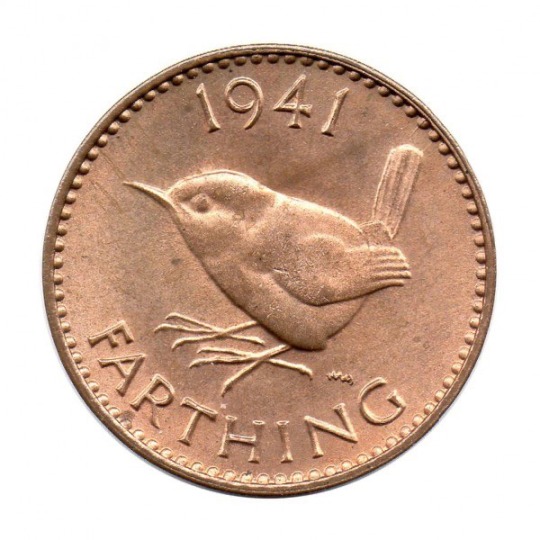
A popular design of a sixpence, the bigger coin in this set, minted in the 1920s and 30s depicted oak branches with acorns. Which means that seen from close quarters, so basically Crowley’s perspective, Aziraphale’s vanishing coin trick leaves empty branches with no bird in sight.
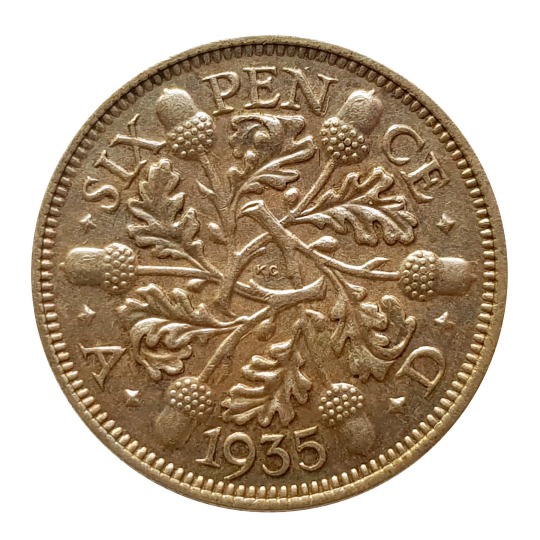
As if that image wasn’t traumatizing enough for almost everyone in the Good Omens fandom post S02E06, the etymology of wren’s name in most European languages refers to royalty in some way. Like a literal king or otherwise supreme bird. That’s why killing a wren or harassing its nest is traditionally associated with bad luck. In certain parts of France it’s still believed that the robbing of a wren’s nest will render the culprit liable to be struck by lightning.
In Irish the wren is called a trickster, which connects to the ancient (as in: mentioned by Aristotle, Aesop, and Pliny) fable on how wren became crowned in the first place — by proving that intellect beats strength:
On one occasion a general assembly of birds resolved to chose for their king that bird which could mount highest into the air. This the eagle apparently did, and all were ready to accept his rule when a loud burst of song was heard, and perched upon the eagle’s back was seen an exultant wren that, a stowaway under its wing, had been carried aloft by the kingly candidate. The trickiness angered the eagle so much, says one tradition, that he struck the wren with his wing, which, since then, has been able to fly no higher than a hawthorn-bush. (Ernest Ingersoll)
In art and folklore this little bird symbolizes rebirth, immortality, protection, and the promise of spring. As a luckbringer it was supposedly present at the stable in Bethlehem when Christ was born; and and Irish proverb runs: “The robin and the wren are God’s two holy men.”
But there’s also a catch. According to legends, it was the flapping of the wings or the song of the wren that betrayed the first Christian martyr, Saint Stephen, while hiding from the mob, and led to his stoning by the Sanhedrin — the highest tribunal consisting of the Head Priest and the Jewish elders.
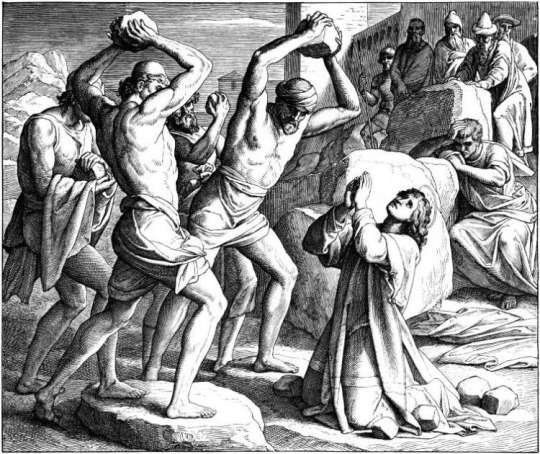
That’s why December 26, his remembrance day, is celebrated in the UK and Ireland as Wren Day. Its highlight was a traditional bird hunt, where the wren as king of the birds was hunted and subsequently paraded through the town and rural areas on top of a pole or holly branch, decorated with ribbons and colored paper, as a substitute of the ancient human sacrifice of the Year King for winter solstice. The wren boys still travel from door to door singing, dancing, and playing music, demanding money to “bury the wren”, but fortunately no more animals are harmed in the process.
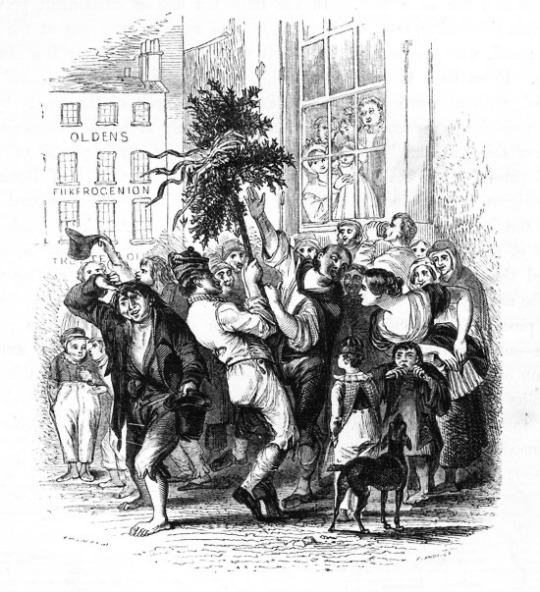
With Aziraphale being chosen as the new Supreme Archangel and literally disappearing from the face of the earth in the season finale, his becoming a scapegoat or a sacrifice to a greater, communal goal might be a real possibility when something goes wrong with the Second Coming. The good news is that this level of danger should be enough to get the Ineffable Husbands back on speaking terms.
#Yuri is doing her thing#Good Omens#Good Omens meta#Good Omens 2#GO2#GO2 meta#Aziraphale#Supreme Archangel Aziraphale#ineffable husbands#1941 minisode#1941 flashback#Fell the Marvellous#magic trick#the farthing has vanished#no nightingales
372 notes
·
View notes
Text
On Monday, a little over two weeks after a traumatic brain injury that caused catastrophic damage, my beloved husband of over 45 years passed away. While I held his hand and gave him one last kiss on the cheek, his breathing slowed than stopped. He was the great love of my life and my best friend.
After a Mass of Christian burial on Tuesday, we'll sing him to his rest. There's a song that's traditional in my family. We sing it at the graveside and those who have gone before us sing in heaven as we do so, uniting the living and dead in love. It was originally in Irish Gaelic but was translated into English about two generations ago.
Into the keeping of God I place you.
May the gate of heaven open to you willingly.
May God come to claim you.
and carry your soul to the City of Saints.
Don't fall in love with this life.
It passes like blossoms on the branch.
Follow the path of those who journey
from this life to the land of the saints.
I'll be back after that because the world doesn't stop for anyone's sorrow or heartbreak. Life goes on and somehow so must I. Mike expects that of me and I'll honor that final wish.
Cherish the time you have with those you love. You never know when it will end.
96 notes
·
View notes
Text
I'm bored and stuck waiting and happened to remember that on my old blog I had made this statement:
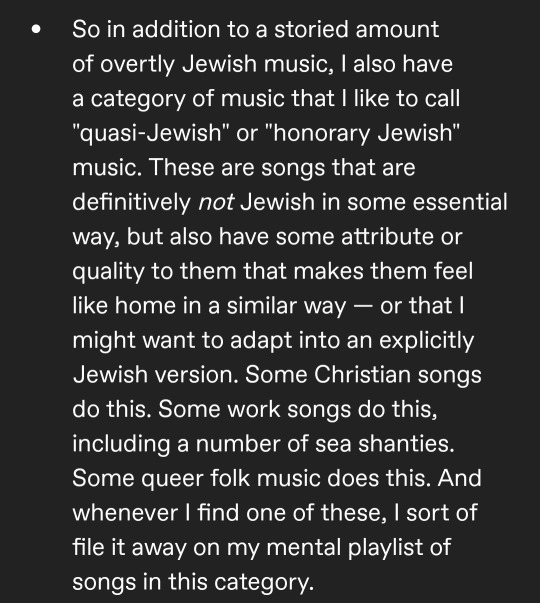
Since I have a minute, I figured I'd finally drop the list with some brief explanations:
1. By Way Of Sorrow - Coyote Grace version
This song and its lyrics, especially as sung by a queer/trans bluegrass band, could not be more Jew-ish in vibe. I am aware this is a cover, but I have only ever heard their version and that's the one that matters to me. I love love love this song, so much, and it perfectly captures how I feel about having been welcomed into the Jewish people after years of exclusion and othering from numerous other quarters. Am Yisrael has taken me in, treated me like family, connected me to the Divine, healed my wounds, and helped me feel as whole as one can in a broken and unredeemed world - while giving me the tools to join the work of tikkun olam myself.
2. The Farthest Field - The Lumber Jills version
This is the best version I could find; the original I was shown I can't find but will link if I do. This song was actually introduced to me by one of my orthodox rabbis, and I agree with him that it can be understood as a beautiful image of geulah.
3. Hallelujah - Coyote Grace & Girlyman
This one just makes me happy, and the words, message, and themes are very on-brand for Jewish vibes as well in my opinion.
4. Be Thou My Vision - old Irish Hymn (this version and this version are my favorites)
This one is very obviously a hymn and therefore decidedly Not Jewish. On the other hand, the words aren't so explicitly Christian that it rules out use by Jews (in my opinion) and especially if you translate the words into Hebrew, it sounds just like a traditional piyyut. (@springstarfangirl if you want to add your beautiful translation, please feel free!)
5. Down to the River to Pray - Alison Krauss
This is one where I do think the lyrics are a lot closer to being Christian specific, but it makes the list for a couple reasons: first, I've encountered it in Jewish-specific contexts without modification (one of our rabbis actually had us sing it like a regular song during zemirot), and second, there's a modified version by Nefesh Mountain that's quite enjoyable.
6. Whither Thou Goest - traditional
Yes, this one is a hymn too, but the words are directly quoting the Book of Ruth - her famous vows to Naomi, and to the Jewish people - and so it's already practically a Jewish song. It also has a special place of pride for me as a ger, and also because I used it as my wedding song in both the English (as heard in this version) and I also transliterated the Hebrew for our singer to do as well. It works nicely in both languages!
7. Roll the Ol' Chariot - David Coffin
This one I think is a little less direct, but I love it and included it for two reasons: first, it's a song of getting through it and surviving and thriving under tough circumstances, and second, you could very easily put liturgy to this melody instead.
8. For the Autumn Sky - traditional
Ignoring the last verse, this hymn could be very easily adapted into a beautiful Sukkot melody. For the last verse, I'd either simply leave it out, or one could write a Sukkot or Tu Bishvat themed verse to distinguish it. Incidentally, this was one of my favorite hymns growing up.
9. Sanctuary - Shaker melody
The video for this one is obviously mega-Christian, but it's on the list because we actually sing it all the time in shul and it has a special place in my memory from going to camp as a kid. Our shul is definitely not the only one who uses it in a Jewish context, either: this version by Cantor Julia Cadrain is really lovely.
10. Genesis 3:23 - The Mountain Goats
Where are my fellow Mountain Goats fans?? I know you're out there, lol. Look, I know that John Darnielle is coming at this from a Christian perspective, but two things: first of all, TMG has a number of Jewish fans I think at least in part because the lyrics speak deeply to the specific feelings around life (and other people) being horrible to you, surviving, and thriving even in the wake of deep trauma. Second of all, I think this one in particular brings up a number of interesting ideas about the meaning of home, of homecoming, of returning to a home that no longer really exists in the same way, and of exile and redemption. What would it look like to return to Gan Eden? Is this what geulah is supposed to look like, at least in some interpretations? What does it mean if not?
Anyway, this is it for now, but I may add to this list later, because there are definitely a few more! Please also feel free to add your own in the notes!
#queued post#jumblr#Jewish music#(kinda sorta)#honorary Jewish songs#Jewish Song of the Day#<<not really but for organizational purposes
111 notes
·
View notes
Note
Ok I sent this to another creator bc like I'm so hooked on this idea.
But like I've seen a lot of claddagh ring content on tiktok lately. If you dont know what a claddagh ring, I recommend googling it(bc my explanation is probs confusing) but in its basics, it's an Irish ring that's worn by all genders as a symbol of your relationship status. Worn on RH facing away from wrist=you're single, RH facing wrist=you're in a relationship, LH facing away from wrist=youre engaged, and LH facing wrist=married.
With a little research(not much just a Google search) they seem to be in Scotland too, but the scotts have a version too called a luckenbooth ring(specific rings either passed from mother-daughter, lovers, or given to a newborn).
I can't get soap being a sneaky little bitch and giving the reader either a claddagh ring and being like "Yeah it's worn this way" and tells her to wear it on her left hand facing her wrist because "That's traditions" Or giving her a luckenbooth ring and then the reader finding out later the symbolism and like confronting him.
─── ─── ・ 。゚☆: *.☽ .* :☆゚. ─── ───
So sorry for the delay, the new school term at my college started and I got so wrapped up with trying to get situated with my new timetable. But hopefully back to regular-ish posts.
*Haven't proofread this yet as it's late and I just want to get it posted*
This is such a good idea, I love it. This concept totally has Soap's name written all over it. Like obviously he's gonna tell other people that you're his, before he even tells you that he has feelings for you.
I had to do a bit of research because I genuinely had no idea what you were on about, but after some research the ideas started flowing. I'm so glad you decided to send me this idea, I think it's really good. I hope this lives up to your imagination and I went with the Claddagh ring for this scenario.
─── ─── ・ 。゚☆: *.☽ .* :☆゚. ─── ───
It's the evening of your birthday and you planned with your friends to meet at the local bar to have some drinks to celebrate. Getting there early you find yourself a seat at the bar, and order yourself a drink whilst you wait for people to turn up.
With a drink in one hand you admire the ring Soap gave you as a present. According to Soap it's a traditional Irish ring, and that it can be worn multiple different ways to symbolise different things. But Soap recommended that you wear it on your left hand with the little heart pointing towards you, as it symbolises the strong friendship that you share between each other.
Your heart swells with how thoughtful of a gift it was, letting Soap put it on you this morning not having taken it off since
Your thoughts are interrupted by a man sitting beside you.
"Hey, I noticed you've been sitting here a while. Are you waiting for someone?" He asks with a big toothy grin plastered on his face, a pint of beer sloshing around in his hand.
"Um, yeah actually I am. I'm waiting for some of my friends" You tell him, uneasiness overtaking your senses, not liking the vibes this man has suddenly given you.
"Oh cool, you mind if I keep you company whilst you wait?" He asks
"Oh I'm not sure-""Oh shit, I'm sorry I didn't realise you were married" He tells you apologising profusely before he's quickly finding somewhere else to sit.
You don't even have a boyfriend, let alone a husband. But before you could question him on why he suddenly believed you were married, you're cut off by Soap coming up behind you and slowly singing happy birthday to you.
"Hey, what's wrong?" Soaps asks concern written all over his face after catching a glance at you confused one.
Pointing at the man that was just sat next to you, you tell Soap about what he said to you before he turned up.
"Mhm, that is strange" Soap tells you "I wouldn't worry about it though, just enjoy your birthday evening"
Agreeing with Soap and deciding not to worry about it, he orders you both a drink to celebrate the special occasion.
Quite a few drinks later you find yourself dancing along to the music playing, Soap close behind with a drink in one hand bobbing his head along to the music. Excusing himself to the bathroom Soap leaves you alone on the dancefloor.
It doesn't take long for someone to approach you, coming up behind you and grinding up alongside you. Grinding up against them you let your hips sway to the music, enjoying the carefree feeling. Their hands land on your hips spinning you around so that you're facing them.
You're faced with a very attractive looking man, not someone you would consider exactly your type but there is no denying that he isn't attractive. His hands roam over your hips and waist pulling you in closer as you grind up against each other. Reaching up to wrap your arms around his neck you see his focus shift over to your hand, specifically the one that wears the ring.
His entire demeanour changes the minute he notices it, letting go of you quickly before he's apologizing and walking away.
Standing alone in the middle of the dancefloor confusion clouds your thoughts as you make your way back over to the bar.
"Hey, there you are" Soap says as he comes up behind you "I was looking for you on the dancefloor and I couldn't see you, everything alright?" He questions
"Yeah everything's fine, it's just I had another guy react the same way" You tell him "The minute he saw the ring he started apologizing and backed away" You say to him
"Weird" Is all Soap has to say about your encounter. Suspicion overwhelming your senses.
"Soap" You say, a cold tone taking over your voice.
"What aren't you telling me" You question him.
"Nothing, nothing I promise" He says
"Soap!" You say irritation lacing your voice
"Okay fine!, about the ring" He says with a sheepish look on his face.
#Scoobywrites#cod#call of duty#cod soap#call of duty soap#johnny soap mactavish#johnny soap mctavish x reader#cod x reader#cod scenarios#soap scenarios#f reader
37 notes
·
View notes
Text
Important Facts about Lughnasadh from an Irish Celtic Reconstructionist
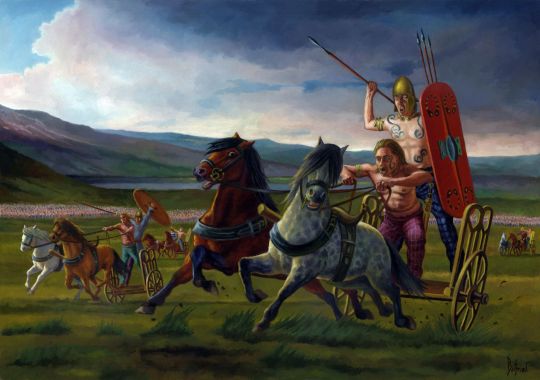
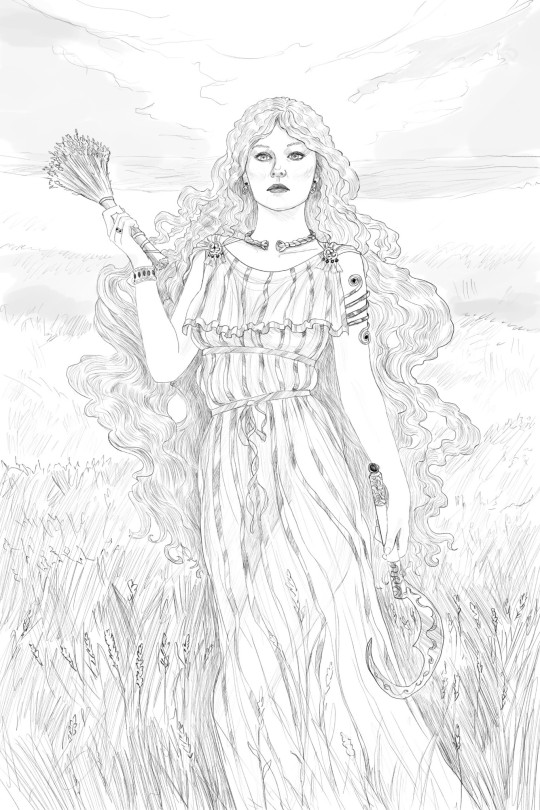
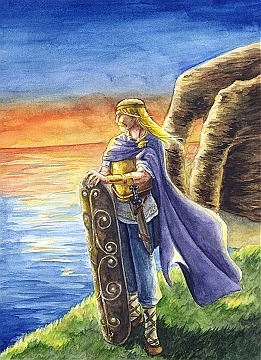
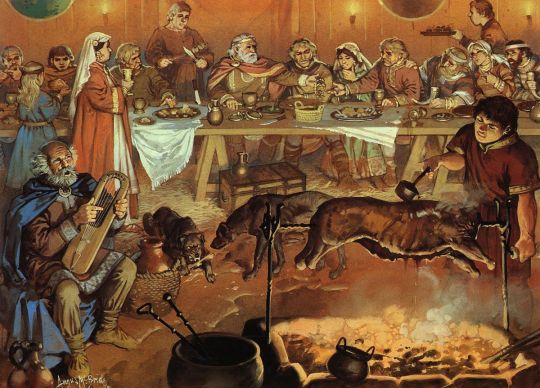
Spelling and Pronunciation
OI. Lughnasadh (Loo-na-sa), sometimes spelled Lughnasa or Modern Irish Lúnasa. Not to be confused with other harvest festivals like Lammas.
Dates
Most reconstructionists celebrate Lughnasadh on July 31st - August 1st from sundown to sundown by the Gregorian calendar, while others choose to celebrate the transitional period between the months as they would have been by the Julian calendar (about 13 days later by the Gregorian calendar).
Traditionally this festival likely would have happened as the grains were ready for harvesting or possibly even when the wild bilberries were ripe (as some scholars mention that if the grains were not ripe they would still preform a ritualized ‘first harvesting’ but it is possible this tradition came after the festival was firmly tied to a calendar date.)
Importance in the Mythos
In the mythologies it is well documented that this festival coincides with Lugh’s funeral games in honor of his foster-mother Tailtiu, known as Aonach Tailteann. In the mythologies she is said to have died of exhaustion after clearing the plains of Ireland for agricultural needs. The first documented instance of Lughnasadh in the mythologies was in the Wooing of Emer, Tochmarc Emire, which makes sense given the importance of marriages at this time of the year. It is not known specifically but widely speculated that the curse of the Ulstermen by Macha took place at a horse race for this festival.
In later time periods it is common to see a form of struggle, normally between the ‘protective’ forces and ‘destructive’ forces. The modern equivalent being the struggle between Saint Patrick and Crom Dubh but this is likely a reflection of an early struggle between Lugh and Balor (which I previously mentioned in my info-dump on Bealtaine).
Celebration Traditions
Aonachs, funeral games, have (to the best of our knowledge) been a custom in Ireland since the bronze age and were practiced on and off into the middle ages. They had both personal and community functions and occurred in three stages. Stage one was the funeral proceedings themselves. They would last one to three days, likely depending on the importance of the individual in question. Mourning songs and chants were participated in by both the attendees and the Druids. The second stage was for proclaiming of laws. Aonachs were a time when universal peace between túaths was declared. The third stage was that of Cuiteach Fuait, games that tested mental and physical abilities. These games included the well known horse and chariot races, wrestling games, boxing, high jumps but also competitions in strategy, singing, story telling and between various skilled craftsmen.
It was incredibly common for marriages to be arranged and preformed during this festival. More well known ‘trial marriages’ (lasting a year and a day) were still preformed at this festival up until the 13th century. It is likely that the coupling occurring at this time of year had an effect on the relationship to births seen at Imbolg (which falls 9 months later).
MacNeill, a leading scholarly expert on the festival, notes that a ritualistic bull sacrifice was made at this festival and the bull would then be eaten. I could not find any definitive evidence to support the idea, but I think it was likely that bulls in general would be culled from the herd at this point in the year to supply the feast.
Art credit @ire-ethereal
#irish#irish mythology#celtic#irish paganism#irish polytheism#paganism#celtic paganism#celtic polytheism#pagan#celtic reconstructionist#celtic reconstructionism#celtic mythology#irish reconstructionism#irish reconstructionist#festival#fire festival#lugh#lughnasadh#Lughnasa#NOT lammas#Tailtiu#harvest#blackcrowing
336 notes
·
View notes
Note
Hi! I sent in an ask a while ago on how I think Gwyn might be a descendant of Oleanna, and came up with the headcanon of Oleanna visiting Gwyn in her dreams like Elena did with Aelin!
To me, Gwyn and Azriel have religious imagery/symbolism. I know that you have a theory on Gwyn & Azriel being the reincarnations of Oleanna & Enyalius (which is also interesting to me), so I just wanted to share some things that I discovered after doing some research!
This post https://www.tumblr.com/mystical-blaise/663854476621479936/berdara-meaning stood out to me.
The name Gwyn mean fair, white, blessed, and holy. The name Gwyneth means happiness.
Gwynedd means white, fair, blessed, pure.
Apparently Gwyneth also refers to Virgin. Her full name can translate to bleeding virgin.
The name Gwenivere is derived from the Welsh words gwen and hwyfar, which mean “white or fair” and “ghost or phantom” respectively. The name therefore means “white ghost” or “white phantom”.
In Malay, Berdarah means bleeding, bloodied, bled, bloody. Berdara in Malay is also virgin.
Sangrava (Sangravah) means used to bleed in Portuguese.
@yazthebookish posted on her Instagram story how it’s interesting that Gwyn wanted to name her sword Silver Majesty and the sword Gwydion kind of ties in both and it could maybe be an easter egg. “Silver: it’s dark blade emits what was described as a holy, savior’s light and that also connects Gwyn’s holy status as a priestess and the light emits when singing. Majesty: it belonged to a High King whose name is also the Irish equivalent to Gwyn (= Fionn). Gwydion: in Celtic mythology is a trickster/magician from the Kingdom of Gwynedd, which the name Gwyneth is derived from.”
Gwynriel’s have come up with theories about Gwyn and Gwydion after ACOSF, and how she might wield the sword. I’ve also seen theories on how she might be the one to find Narben.
In Medieval Christian theology places seraphim in the highest choir of the angelic hierarchy. They are the caretakers of God's throne, continuously singing "holy, holy, holy".
In the Book of Isaiah (Isaiah 6:1-8) used the term to describe six-winged beings that fly around the Throne of God crying “holy, holy, holy”.
In the Bible in Luke 2:13-21 it says: “Suddenly a great army of heaven’s angels appeared with the angel, singing praises to God: ‘Glory to God in the highest heaven, and peace on earth to those with whom he is pleased!’”
I wonder, have some people ever stopped to think that maybe the reason why Gwyn glows when she’s singing is because it’s something holy and pure, not because she’s “evil”? Even if Gwyn does turn out to be a lightsinger, SJM will not make her a villain, and it would make her an equal to Azriel (she already is). It would be another parallel between her and Azriel, which they already have multiple parallels.
The name Azriel means God is my help.
In Islamic and Christian traditions, Azrael is the name of the angel of death, one of the four archangels; the angel of death who separates souls from their bodies. Apparently he proved to be the only angel brave enough to go down to Earth and face the hordes of Iblīs, the devil, in order to bring God the materials needed to make man. Fun fact: Azrael’s attributes are wings and a cloak. (Azriel wrapped Gwyn in his cloak when saving her.)
Ramiel means thunder of God. We know that Ramiel is important, it is Illyria’s sacred mountain, it is regarded as the holy mountain of the Night Court. Where the warriors are when the Blood Rite ends sorts them into one of the three echelons of warrior, name after their holy stars. One of the seven archangels listed in the Book of Enoch, Ramiel is considered to be the angel of hope, guiding faithful souls to heaven and watching over those who will be resurrected. Throughout the New Testament, Jesus is associated with mountains. Mountains are mentioned more than 500 times in the Bible. The Garden of Eden was believed to have been on a mountain. Mountains have a logical religious symbolism for Jewish and Christian cultures since they are “closer to God” who dwells in the heavens (as in the sky). As a result, God often reveals himself on a mountaintop in the text. In the Old Testament, the mountains of Sinai and Zion are most significant.
The name Oleanna means light. Didn’t Oleanna, a high priestess, create Gwydion and gave it its powers when she dipped it into the Cauldron?
In Greek mythology Enyalius is generally the son of Ares by Enyo. Enyalius is often seen as the God of soldiers and warriors from Ares cult.
All of this just seemed really interesting to me. SJM minored in religious studies, so it’s possible she is well aware of some of this or has done some research. There is a lot of religious symbolism and imagery when it comes to Gwyn. No one is “stealing” the religious aesthetic from E/riel’s. Gwyn and Azriel as characters themselves have religious imagery. Gwynriel as a ship has religious symbolism. It wouldn’t surprise me if SJM played into this and I really hope she does. The saint and the sinner. I’ve thought for a while now about making edits of Gwyn and Gwynriel that are religious themed, but I’m scared of E/riel’s saying that I’m stealing their aesthetic, since they’ve accused Gwynriel’s of stealing the light and dark aesthetic. But Gwynriel does actually have a light and dark aesthetic, and E/riel’s use the Hades & Persephone thing despite it being Feysand’s.
Hi Anon,
Everything you have written is interesting and I would love to take my time and explore every single point you made ...
Its all very interesting and I could see Oleanna and Gwyn having a connection similar Enalius and Az ....
Illyrians were made and the leathery wings indicate they were an experiments with creatures from the hel realm ....Now cut to Gwyn who was conceived by a priestess on the holy night of the great rite... it will almost be poetic if Az wields a weapon made from dark power and Gwyn ends up weilding a weapon made from holy power the warrior mates who are also Carynthians.
So Gwyn and Az have the whole holy unholy aesthetic going for them .... saint and the sinner .... carynthian warriors ... and yes Light and dark too.
Light and dark is such a common aesthetic.... it is also a Feysand aesthetic, Ruhn Lidia aesthetic ✨️... you cant gatekeep such a generic aesthetic.
Their book my friend will win hearts and be an absolute masterpiece .
I am very curious as to what Gwyns power is .... being Azriel's mate it would need to be something equally unique and powerful and yes I do believe her power will be something Holy ... she already has the invoking stone that she channels the mother's power from but even apart from that I believe her glow could be something holy ✨️
#gwynriel#gwyneth berdara#pro gwynriel#gwyn acosf#acotar#azriel shadowsinger#gwyn x azriel#azriel#post acosf#acosf theory
24 notes
·
View notes
Text
Why Ireland Should send a Traditional Irish Song in Irish to Eurovision.
This is different from my usual posts but I just wanted to get my opinion out there😁
Before you roll your eyes at me, just let me explain. Recently, Ireland has sent really, really, REALLY bad songs to Eurovision and because of that, we haven't qualified for the Grand Final in over FIVE YEARS!!
Recently I have noticed that folk songs or songs inspired by folk music have done well (for example My Sisters Crown from Czechia which placed 10th in the grand final this year), so I started digging deeper into own-language songs and how well they've preformed.
This year proved that non-English songs can become international hits (for example Cha Cha Cha from Finland), and for some time now, I have seen fresh calls from people for Ireland to send an Irish song or a trad song.
As a fluent Irish speaker, I would love to see my language represented at this competition and for the European (and Irish) people to see how beautiful Gaeilge is, but our major challenge is the Irish people themselves.
Irish people have a hatred for Irish because of how it is taught in schools, and they refuse to take a chance to send a song that is DIFFERENT.
So if you speak Irish (and if you can sing) please, PLEASE consider entering a song into our National Selection for Poball na Ghaeilge (and to somewhat redeem ourselves in this competition)
#Eurovision#Esc#Gaeilge#Malmö2024#Ignore any grammatical errors please#I can't type to save my life lol#Vesna#käärijä#I will return to stupid lazy posts later don't worry!!!#Irish#Ireland
135 notes
·
View notes
Note
Care to share some of your GCBC headcanons?
🔸️ I'm going to be pulling a lot of these from previously answered asks. It'll be nice having them in one spot.
✮ Their full name is Garrett William Copp. They developed as a "they", but Ma and Pa didn't realize it until they were a few months old and began to show two distinct personalities. So Good ended up getting called Garrett, and Bad ended up getting called William. He vastly prefers his name to be shortened to Liam. Don't ever call him Will. Especially don't try calling him Bill.
✮ Their birthday is October 31, 1969. (Yes, I am aware that would make them 54 now. It's still 2014 for them.)
✮ Bad has always enjoyed physical activity and played many sports when they were kids. His favorites were baseball and track & field. He also took up boxing in college. Good had more of an interest in theatre- Bad gave up sports their senior year of high school so Good would have the time to do something he enjoyed for once.
✮ They had difficulty controlling their switching when they were younger- Good especially. He's always been the stronger of the two of them that way and can easily take control from Bad, no matter how hard Bad tries to resist. Unfortunately this, paired with Bad's need to be active, often led to injuries.
✮ Existing as they do also led to a lot of bullying and fights throughout school. Bad was always quick to switch in to defend Good- but he never threw the first punch.
✮ Bad prefers savory flavors, while Good prefers sweet. This played a large part in why they chose their particular culinary skills.
✮ Good has always been better at things like math and chemistry, which helps a lot with his interest in baking. Bad, with his long-standing love of reading, is remarkably good at things like spelling and grammar- to the point he turns off spellcheck and autocorrect on every device they use because it just drives him crazy.
✮ They both have specific emotions that they feel very strongly, and specific emotions they have a very difficult time feeling at all, and often need the other to either bring them back down or help them process it. Good's strong emotion is joy, and the emotion he is incapable of feeling on his own is anger. The most he can feel without Bad's help is annoyance. Bad is pretty much the opposite. He often needs Good to help keep his quick temper in check, and without Good's help, the happiest he is capable of feeling is 'content'. They both feel sadness/despair the same; Good is just much more comfortable with and capable of crying. Bad has to reach some pretty extreme limits before the tears will finally come.
✮ They dream together! Not always, but about 90% of the time. Sometimes they still share a body, sometimes they're separate. They especially like the dreams where they're separate and have been practicing lucid dreaming because, even if it's only a dream, they enjoy having the chance to do things together like normal brothers. They know they wouldn't be able to function if they really were separated though.
✮ Bad's tastes in music are pretty much limited to classic rock, traditional Irish, and ambient/atmospheric (think movie/video game music). Good, on the other hand, will listen to just about anything- especially if it's loud, upbeat, or both. His favorite genre is symphonic metal, and Bad often tells him he sounds like Fabio (former lead singer of Rhapsody of Fire) when he sings, just with a different accent.
✮ They very likely have the creative spark needed to be a Master Builder. No one's ever bothered to try training them to find out though.
✮ They're both mainly coffee drinkers. Bad prefers his black (maybe every once in a blue moon with just a touch of sugar), while Good prefers lattes, usually mocha but sometimes with other flavor shots, depending on what he's in the mood for. They're the same way when it comes to tea, as rarely as they drink it. Bad prefers hot herbal teas (specifically mint or chamomile) to unwind in the evenings, also very rarely sweetened. Good likes tea lattes (London Fog is his favorite so far) or milk teas for a sweet caffeine boost that's different from his usual fare. The only iced tea either of them will drink is their mom's sun tea, which she sweetens with honey and adds fresh crushed mint leaves to.
✮ Aside from seasonal allergies, they're allergic to mosquito bites. It's not life-threatening but any bites they get do swell up to be at least the size of a golf ball.
✮ They are what some would call "sensitive" or "intuitive". They have been able to see ghosts since they were young. Bad Cop in particular tends to get surprisingly accurate gut feelings about situations (not 100% of the time, but definitely more often than not).
24 notes
·
View notes
Text
Traits Based on Your Day of Birth in Medieval Irish Tradition
In the Leabhar Uí Mhaine there is a text which ascribes certain traits and fates to someone based on the day of the week they were born(Source)
Monday:
He who is born on Monday, his wealth in cattle will be good, there will be a blemish on his face, he will not be sharp, he will be generous, many culdees* will sing his requiem, and repentance will come to him before death
Tuesday:
He who is born on Tuesday, drowning will carry him off, great will be his wealth in small cattle, his power will not be strong, he will be a favourite with women and dogs.
Wednesday:
He who is born on Wednesday, a blemish on his body, he will die a bloody death, his speech will be venomous, he will be hated, he will be a powerful plunderer, he will do a dire deed before death.
Thursday:
He who is born on Thursday will die at Vespers**, either by a swoon or a fright, he will be longlived, he will be loving, he will have many children, whatever may be the art he may exercise, he will be good in it, he will be harsh.
Friday:
He who is born on Friday, he will have a death of repentance, he will be covetous, he will have wealth of gold and silver, his tribe and race will serve him, he will be bloody, he will be rich in the praise from men
Saturday:
He who is born on Saturday, fever and a bowel-disease will carry him off, great will be his dignity, he will do evil deeds, he will be venomous, he will be a parricide, he will do many slaughters, he will lead a licentious life.
Sunday:
He who is born on Sunday will be longlived, his life will be happy, he will have wealth in the world, he will be in favour with kings and erenaghs, great will be his power, his profit in his own hands.
*Culdees being similar to Monks
**Vespers being evening prayers
#irish paganism#celtic paganism#gaelic paganism#ireland#resources#mine#draíocht#irish mythology#draoí#This is a pretty late text I think so don't take it too seriously ok?#gaelpol
108 notes
·
View notes